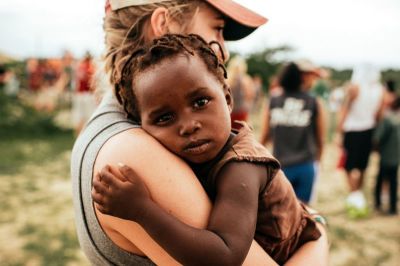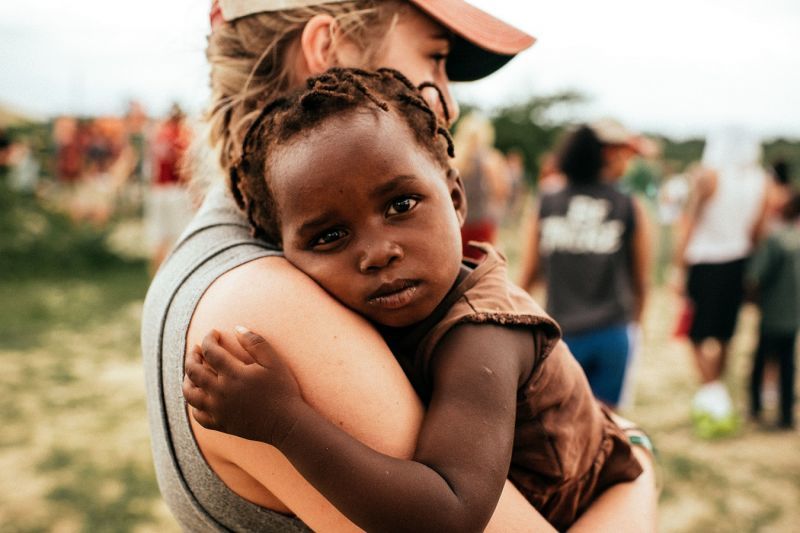
During my first few short-term mission trips to Haiti, I didn’t question why the children we visited were in orphanages. I had heard the staggering number — that there were nearly 150 million orphans worldwide — but I was completely unaware of what that statistic really meant.
I had assumed orphanages were a last resort, and that these orphans had no living family. I was mistaken. The majority of children living in orphanages today have been surrendered because of poverty, not because there is no one to care for them.
I was also mistaken about what they and their families really needed in order to stay together.
As a social worker here in the States, I felt strongly that children should be in families, whether that was biological family, or in kinship or foster care. I knew from my domestic work that family-based forms of care were the best chance for a vulnerable child — but what I didn’t understand yet was that this was also true globally, and that I could play a part in making this change.
My work here and abroad taught me that there are hardships worse than experiencing material poverty. Relational poverty can be far more devastating for young children.
This perspective was solidified one day at work when a little red-haired boy came in who needed a safe placement. He was about the same age as my niece, then just five years old. Sadly, we couldn’t identify relatives, neighbors, or anyone else the boy already knew who could safely care for him. The only placement we could find was a group home, nearly two hours away from everything and everyone he’d ever known.
While a world apart from the children I worked with in Haiti, this little boy shared one of their most excruciating forms of need: the need for a consistent, supportive caregiving relationship and a network of equally consistent support around that caregiver.
With one foot in the social services sector and the other in vocational ministry, I quickly realized bridging the gap between these two typically separate spheres could make all the difference for a child in need, both domestically and internationally.
Struggling families often need support to stay healthy and stay together. But their needs go beyond the tangible. Relational connections can help families build capacity just as much as material relief.
The church has a long history of helping children and their families during times of crisis. But we can enter into a supportive role so much earlier, and as a church, we’re well-positioned to do so. When we also build relationships before a crisis, vulnerable families can feel less isolated and more connected in the community. Ultimately, this relational support prevents children from being unnecessarily separated and builds stronger families.
And stronger families benefit everyone. Research shows that kids are more likely to have positive long-term outcomes when they are kept within their family networks or are allowed to maintain a single, strong, positive relationship with a primary caregiver — ideally, a parent.
When this isn’t possible, the church can support children in kinship care and foster care within their own local communities. Children raised in a family setting within their community maintain a sense of belonging as well as important connections to their culture.
During times of crisis, meeting material needs is necessary, such as after the 2010 earthquake in Haiti. But material support isn’t an endpoint. It’s the Church’s chance to establish relationships that might make all the difference.
As a Church, we can invest in local networks of care, and support those who have proximity to such families. Groups like Konbit Haiti come alongside vulnerable families in the country to strengthen them holistically. Through educational opportunities, childcare and medical training, parents are empowered to keep their families together.
Instead of looking for ways to do something for a community, we can look at the strengths of the community — and then support the solutions already in place. We can help to build resilient communities and families who can thrive and focus our giving towards that end.
All children need loving families, whether they’re here in the States or living in Haiti. And for the families who are struggling, they in turn need our support to stay together.
When we are willing to channel our support in such ways, we can help vulnerable children both in our own neighborhoods and in communities on the other side of the world grow up in the loving care of a family — but first, we must resolve to make it so.
Kristin Langrehr is a licensed social worker who earned her MSW from the University of Oklahoma and has spent her career working in the field of Child and Family Advocacy. She has a heart for ministry to the most vulnerable through the context of the local church. This passion manifests in both her personal and professional life, with a husband in vocational ministry, two sons adopted from Haiti, and a daughter born with Down Syndrome. Kristin is the Western Oklahoma Director for 111Project, a faith-based, non-profit organization that implements a care-sharing technology called CarePortal and equips the church to make meaningful connections through meeting practical needs.








